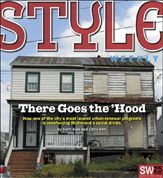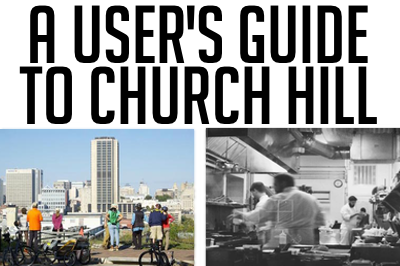RECENT COMMENTS
Joel Cabot on Power Outage on the Hill
Eric S. Huffstutler on What is up with the Church Hill Post Office?
Eric S. Huffstutler on What is up with the Church Hill Post Office?
Yvette Cannon on What is up with the Church Hill Post Office?
crd on Power Outage on the Hill
There goes the ‘hood?
04/10/2007 10:45 PM by John M

Style Magazine gives Church Hill the cover in There Goes the ‘Hood – How one of the city’s most lauded urban-renewal programs is reenforcing Richmond’s racial divide, a look at the social effects of restoration/renovation/gentrification/etc:
Each year she watches homes down the street and on nearby blocks turn over to new neighbors. She’s one of the few old-timers left, she says.
The new residents — many of them white families — are seizing opportunity. They snatch up good deals on old, dilapidated houses that have suffered the neglect of senior tenants who lacked the financial resources to keep up. They invest thousands of dollars in the houses, often flipping or selling them for two or three times what they paid.






Isn’t it odd how capitalism works?
Back our way, the renewal has led to a modest amount of racial and economic integration and a higher number of single black female homeowners. We’ve also recently seen families with children move in.
The area has also gotten safer and cleaner, and the long-time homeowners that are truly invested in the neighborhood are very happy to see the changes; they have in fact worked for this to happen. Look at the quotes from Mrs.Thompson and Ms.Carter in the USA Today article from back in December to see what I mean.
Urban renewal is a double-edged sword. I attend a church on Marshall, and several of our members have been forced out of the neighborhood due to rising tax assessments. And there’s absolutely no question that historically the neighborhood, especially Marshall St. and south, has changed in racial and economic makeup. I thought the Style article showed a nice balance- while it’s focus is on poor folks and the need for affordable housing, it does raise up the voices you mention, John, about the benefits of redevelopment.
“There Goes the ‘Hood” is also the title of a 2006 book written by Lance Freeman who is an Assistant Professor, Graduate School of Architecture, Planning and Preservation, Columbia University. See link: http://www.temple.edu/tempress/titles/1827_reg.html
The end of the article rounded things out. This *doesn’t* just impact blacks. Everyone middle class and lower is impacted by the radical (and irrational) increases in property values.
The article is right to put some of this on the Counties. The poor of the counties were funneled into the City for years, and now that the City is recovering, the greater region is doing nothing to help displaced people (they all aren’t just from the I-95 corridor but from everywhere).
On another note, I think something the article fails to adequetely mention is that much of the redevelopment in this neighborhood has been of long vacant houses. Certainly the redevelopment of a vacant house can affect the property value of a neighboring house, but in many (if not most) cases there is no sympathetic tenant being run out of the renovated house. The author is really stoking the flames here where there isn’t as much to stoke as he thinks.
Also I think it belittles renovators by calling them hobbyists. Renovation of these old houses is real work and a full-time job for many. Profit margins are thinner than the article supposes.
I think one comment from an interviewed person is key here. The person said something to the effect of he’s not concerned with the vitality of the neighborhood or city, just getting services to the poor. The City can’t afford to provide services to anyone if no one will live here – I think that’s a point the author skirts.
Last friday my wife and I were out walking with our newborn and our dog and got the “there goes the hood” look with accompanying comments about the neighborhood never being the same from a guy who was also enjoying an afterwork stroll except that he was smoking a joint and waiving down traffic in attempts to either buy, sell, or smoke some more weed. It made our day.
This argument about displaced homeowners is made in every city lucky enough to experience urban renewal. ANd they always cite the poor older homeowners on a pension that the tax increases force out. They fail to mention that 1) many localities have programs to alleviate this pressure by deferring the tax increase until the property is sold and 2) if they truly own the property, then they are selling it for a profit and can use that money to either upgrade somewhere else or buy another hovel and pocket the rest.
It seems like the rising property values wouldn’t affect long-time homeowners that much. Their taxes would go up, but figuring in inflation, their mortgage has gone down considerably over the decades, if it’s not paid off completely. The city also provides tax relief for people over 65 or who are disabled. And if things really get tight, older homeowners can also consider reverse mortgages.
Rising property values would however greatly affect renters and those people who were looking to buy homes.
I don’t think poor homeowners are being pushed out. It’s just that there are fewer affordable-housing opportunities for people moving in — therefore changing the economic and racial makeup.
And this doesn’t just happen in cities. The same thing is happening to poor residents in many rural areas too.
Sorry. I’m just not going to feel guilty about increasing my neighbor’s property values.
What we need to remember,too, is this whole area was once white. It was about 60 years ago when MY parents and grandparents lived on the Hill and in Fulton. My mom went to East End Junior High School and John Marshall High School. When that generation (the WWIs) began to get old and pass on, the houses were sold cheap and the Hood started. From about 1970 or so is when the White Flight started. I should know. I was forced from MY childhood home, just off Jennie Scher Rd, so RRHA and the City could build Woodcroft Village. I moved to Henrico County, as did many of my neighbors.
So, this whole Hood thing is crazy. For someone to look at me like it’s “their” hood is nuts. Someone needs a Richmond History lesson. Now, this is our “neighborhood.” If you want to live here, make nice, suck it up and behave. If not, leave. If you don’t want to leave, keep screwing up. The Police will get you.
Actually, Church Hill has always had white and black residents. Many houses north of Broad were originally owned by blacks. We own a home that was built in 1882 and the orginal owner was black. We got that info from the Valentine History Center library. We also had a black neighbor who had lived in his house on our block for 80 years.
I never said the area was ALL white although it sounded that way. I misspoke. The area was mostly white but that aside, the neighborhood belongs to everyone not just the portion of population that thinks they MADE the hood.
I would like to hear from anyone who grew up here and was forced to move as I was.
I was dissatisfied with the Style article for many reasons, but one in particular bothers me: I didn’t notice many suggestions for solving the problems Scott Bass and Chris Dovi present.
Here’s one: the City of Richmond does have a property tax relief program for seniors and people with disabilities; perhaps we need to make sure that our neighbors know about it so that they can take advantage of it.
There are tax relief applications, along with other city program materials at the EDI Center if anyone wants to get a quick copy, or hand them out to their neighbors.
Elliot
You need to go take a look at VCU’s Virgina Black History Archieves, focus on the Church Hill section. There you can read transcripts of interviews with Afircan Americans born on church Hill dating back to ealry 1900’s (far before you history of 60 years)
Its not about black/white, its about working together to build our community back up to what it once was.
Online @ Virginia Black History Archives – Church Hill Oral History Collection
I know that it’s about all of us working together but, and you must admit, there is a certain percentage of the population who do not want to work with anyone. That is my main point. In this day and age, the more we work together, the better off we all are. I, too, have been the target of “this is OUR hood!” and the Style article set me off. Sorry for being so abrupt and sounding like an idiot. Which I am not.
I have to agree with Archie Bunker on this one. I have no problem increasing the property value of my house or those around me.
For the most part Church Hill is AFFORDABLE housing in the Richmond area except for south or closer to Broad. I come from a poor background, have put myself through school, have worked hard for what I have and when it came to buying my first home I couldn’t afford much more than a condo or something here in the Hill. I have embraced this neighborhood for the past 3 years and will continue to do so but I can’t stand the stereotyping on both sides of the arguments against white or black around here. Get over it!
Don’t look to the government for the answers. Heck…pick up a history book and see how society throughout history has dealt with the poor populations. Look at our systems and welfare programs, which have only perpetuated the existence of poor and rewarded sloth like behavior. No one group in history has broken out of the cycles of economic hardship until they first looked to him or herself and changed their ways.
For the populous to argue that “whitey” is taking over the hood is only an excuse from a populous that will also state that the government hasn’t given them the opportunity needed to live. Well…the last time I checked the government didn’t go to work for me, didn’t pay my mortgage, didn’t pay my car payment, and didn’t put me through school. Most of those things the government offers subsidies to those who are not of my ethnic background. And try to get ahead in today’s corporate environment being a white male as we are being persecuted for the sins of our fathers and are pasted over due to diversity quotas.
Don’t get me wrong here. I feel for the older generations that cannot afford the increased taxes. But as mentioned above there are programs to assist such people. But I am tired of looking at the blight, picking up the trash in front of my house from the arrogant people that don’t care, and the drugs and crime that are so rampant in front of my eyes yet nothing seems to be done about it.
So I have no problem doing what I can to increase the property values to force out an element in this neighborhood that just doesn’t care about others and only brings crime and hatred to the streets. So if this makes me guilty of gentrification then so be it…because I welcome my increased tax bill every year! I just wish the government would spend my money on changing the problem than continuing to perpetuate the problems by giving handouts.
I was one of the early urban pioneers in the hill that initiated upscale, high end renovation on houses where the majority of the block was blighted. At the time, this was a very risky financial move that could have gone one of two ways. Transforming a dilapidated block always starts with one home first.
I have absolutely no guilt for preserving finer homes and returning them to past glory. One by one, homes were renovated and the blocks started to become desirable to the rest of the city.
We’re supposed to feel bad about that??
Increasing property values and providing tax revenue for the city coffers to provide more services to the poor is now a bad thing? These folks should be happy about the vitality of the area as opposed to blaming them for the plight of the poor and useless. Give it up.
What bothers me is that the article seemed to want to create a greater black vs. white problem. This should not be a race issue. All races have an equal opportunity to buy and fix up homes here.
I worked my butt off to buy my house and to have someone criticize me for hard work, and encourage laziness is just plain ignorant.
I am so happy to walk down the street and see the development. I see hope. Hopefully those that chose not to work and better their lives will be inspired to change instead of fight against it. Personally I would prefer to see responsible homeowners move in next door instead of drug dealers. If the drug dealers decided to get a job and go to school, they too could own a home here in Church Hill.
What bothers me is the writers did not give any real fix to the problem in this article. It was preaching hatred! It also had a lot of half truths.
Progress is a good thing. Why would you want to keep the neighborhood down?
if you believe that the steps to ‘better your life’ are simple as deciding to ‘get a job and go to school’, i really hope you’d consider volunteering for a few hours a month to mentor the kids in the neighborhood or volunteer for CASA. if you still feel the same way about what it takes to ‘better your life’ then i would like to know so that i can apologize to you for judging you for your comment.
This article lacked some nuance to say the least. Bumper sticker journalism (and disappointing considering Scott Bass has distinguished himself as a pretty good journalist). What I got from this article was not that gentrification hurts the poor or racial minorities, which was the curious angle of the writers, but instead, it mostly effects fixed income elderly who own their own homes and lack the funds to pay for the increased taxes. So, how many of these people actually exist? Seems a reasonable question. Do they outnumber the renters who are not directly hurt per se, or the new comers, or the empty houses and empty lots? By how much? The reporters seemed to find at least one of these folks to talk to. I recall when I owned a small apartment house in another city, I had an elderly couple living on the first floor and I refused to raise their rent for fear they could not pay it and it would displace them. Well, when I sold the building, the new owner upped their rent almost 100%. They paid it, and 5 years later, they still live there. While I am not a huge fan of the use of the anecdote to make broader societal points, …there you have it. Who are these displaced folks? (it would seem the large group of truly vulnerable in this city have never been homeowners nor do they ever stand a chance to be…especially with the sub prime lenders in retreat) Where do these displaced folks end up living?
Plus, why not find a black middle class gentrifier or two to better disentangle the class from race issue in this discussion. In short, more analytical nuance please!
When I originally moved onto Church Hill, I thought I was moving into a great neighborhood – one with a very diverse socioeconomic population. It’s really not that way at all. The amount of wealthy white people living on Church Hill is surprising and almost as disappointing as their condemnation of their less affluent neighbors.
You just moved to the wrong part. How far north did you look when you were looking at apartments?